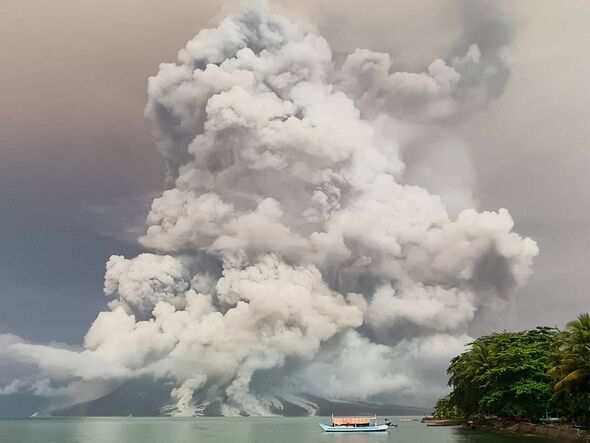A tsunami alert has been issued after a volcano in the infamous ‘Ring of Fire erupted and spewed out a mile-high ash plume.
Yesterday’s eruption (Tuesday, April 30) in Indonesia was Mount Ruang’s second in a month.
It has caused widespread disruption with an airport forced to close as ash was propelled nearly a mile into the sky – and debris rained down on nearby villages.
The Indonesian Geological Service has urged locals and climbers to maintain a distance of at least 3.7 miles from the volcano’s crater.
This follows an increase in the alert level for the Sulawesi Island volcano after sensors detected heightened volcanic activity.
READ NEXT: Watch dramatic moment huge volcano erupts sparking tsunami warning
Yulius Ramopoli, head of the Mount Ruang monitoring post, described the vibrations as so “intense” that it “shook everything around us”. He said: “It was dark with rocks raining at the post from the eruption.”
“The vibrations were intense and knocked out power, and volcanic earthquakes shook the glass windows and everything around us.”
He reported that the eruption obscured the sun and showered several villages with falling debris. However, Mr Ramopolii confirmed that no casualties have been reported.
Situated in North Sulawesi province, the rumbling 2,378ft Ruang volcano sits just 59 miles northeast of Sam Ratulangi International Airport in Manado, the provincial capital.
According to the head of the regional airport authority, Ambar Suryoko, the airport facilities were forced to shut down on Tuesday due to poor visibility and the threat posed to aircraft engines by ash.
The lands trembled as motorists in surrounding towns, including the bustling Manado, were forced to navigate under an eerie daytime darkness. Vehicles’ headlights pierced through a storm of falling ash, grit and rock.
Last month, more than 11,000 people were hastily evacuated following an eruption on April 17, when governing authorities issued warnings of possible tumbling volcanic debris causing tsunamis that could devastate nearby villages.
Around 3,000 residents remain displaced after that eruption and – before yesterday’s eruption – the government had cautiously downgraded its alert level from four to the second highest, reopening the airport after four harrowing days.
However, the nation’s geological agency issued a fresh warning yesterday, cautioning the inhabitants of Tagulandang Island of potential hot volcanic clouds and tsunamis resulting from volcanic material entering the sea or the collapse of a magma-filled dome into the ocean.
